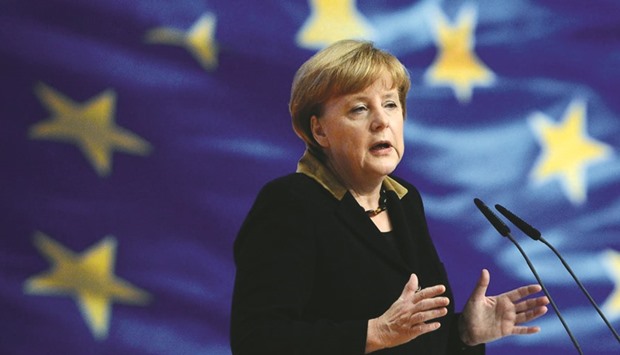German Chancellor Angela Merkel has criticised the anti-immigrant Alternative for Germany (AfD) party, saying that it stirs up prejudice and polarises society.
Her comments, made in an interview with the Bild am Sonntag newspaper, reflect growing unease among Germany’s mainstream parties amid rising popular support for the right-wing AfD and its fierce opposition against Merkel’s refugee policy.
Merkel faces one of her toughest electoral tests in three regional elections on March 13.
The AfD is set to win almost 20% in the eastern state of Saxony-Anhalt and match the ruling Social Democrats in the southwestern state of Baden-Wuerttemberg, according to the most recent polls.
“The AfD is a party that is not bringing together society and not offering the appropriate solutions for the problems, but it is stirring up prejudice and polarising,” Merkel said.
The elections in Saxony-Anhalt, Baden-Wuerttemberg and Rhineland-Palatinate states are Germany’s first since last May and will serve as a litmus test of popular feeling after more than one million migrants arrived in Germany last year.
Merkel said government officials and mainstream parties had to challenge the AfD in public debate by clearly distinguishing themselves from its anti-immigrant stance.
The centre-right chancellor defended her decision to keep Germany’s borders open despite the influx of migrants and reaffirmed her push for a joint European solution, including strengthening the continent’s external borders and co-operation with Turkey to stop refugees from travelling on to Europe.
“We can only meet this challenge together,” Merkel said.
The EU emergency summit with Turkey scheduled today will focus on how Ankara was planning to spend €3bn pledged by EU member states to stem the flow of migrants to Europe, she said.
Leaders should also discuss how EU member states could help Greece to cope with “this difficult situation”, Merkel added.
Austria, one of the last stepping stones to Germany for hundreds of thousands of migrants, recently imposed border restrictions, setting off a domino effect in Europe and leaving tens of thousands stranded in poor conditions in Greece.
The move, which was publicly criticised by Berlin, reduced the number of new arrivals to Germany.

Merkel: We can only meet this challenge together.
